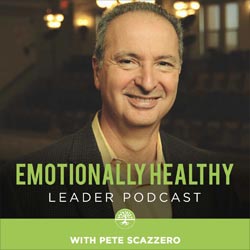


👉 Download the FREE Emotionally Healthy Leader Discussion Guide at emotionallyhealthy.org/leader
—---------------------------------------------------
Most Christian leaders are taught to prioritize ministry first—leaving marriage, singleness, and sexuality in the shadows. But what if the loudest gospel we preach isn't from our pulpits, but from how we live out our deepest relationships?
In this powerful episode, Pete Scazzero uncovers a profound, often overlooked truth: your marriage (or singleness) is not a private matter—it’s a sign and wonder, a living revelation of God’s love to the world. Drawing from decades of ministry, his own marriage journey with Geri, and Scripture’s radical vision for union, Pete challenges leaders to flip the script.
This isn’t about managing your relationships. It’s about transforming your leadership from the inside out.
If you're married, make your spouse your first ambition. If you're single, live out your calling with the same intentionality. The church will never be whole until we lead out of healthy, loving, God-centered relationships.
Listen now—and join the revolution.

In part 2 of this week's podcast, Pete continues to build on the theology of rhythms and limits from Genesis 2:15-17. Pete expands on how our teams must seek to apply this to our most important task which is cultivating a deep spirituality with Jesus. It is crucial that we understand how much of a critical theme this is for all of us going into the future.

In this week's podcast, we learn how limits and rhythms are two of the most difficult truths in Scripture to embrace; and how it is very important for teams to be able to embrace these limits and rhythms. Pete gives us two critical questions that teams must be asking in order to lead from a healthy place.

Each of us has been “formed/discipled” by our family of origin in the early years of our lives – whether we were Christians or not. In part 2 of his podcast, Pete invites you and your team to do three things that will encourage you to continue learning and being formed into disciples of Christ.

One of the core pillars of "Emotionally Healthy Discipleship" is going back to go forward. In emotionally healthy teams, people understand that their family of origin has enormous significance in their ability to function maturely as a team. In this podcast, Pete shares five major points in how making sense of our stories can powerfully transform us, our teams, and those we lead. May it be an encouragement to you and those you lead.

In last week's podcast, Pete introduced us to the first five questions that he has asked himself and others when preaching a message. In part 2 of this week's podcast, Pete dives into the final five questions, while making suggestions that will make your preaching experience rich and enjoyable. May this podcast be a blessing for you!

In his first podcast of 2020, Pete shares with us the first five important questions that will make sure we make room for God to do His work in our lives. If we can learn to apply these questions to our lives, then these will surely help many leaders and preachers to preach in ways that will lead others to more authentic transformations.

In his last podcast for 2019, Pete offers us an inside view of Moses and his leadership in the midst of great pressure at the Red Sea. It is through this pressure that Moses makes critical leadership choices, and Pete offers us a model of those five leadership choices for us to reflect on as we enter 2020.

In his podcast, Pete shares a critical truth that has shaped his life and leadership for many years. Pete expands on the spiritual truth found in the story of Mary's visit to Elizabeth. As you listen to this podcast, may you be able to meditate on the new thing God may be birthing in you. Jesus is inviting you to slow down to listen to Him. Will you do this for Him?

In this week's podcast, Pete touches on a subject that is a challenge to every leader-being able to have patience in a world that is impatient. Pete explains why learning to wait patiently is one of the greatest gifts we can give to those around us. May we be able to "Be still before the Lord" and learn to wait on Him.

In this week's podcast, Pete shares five specific leadership mistakes to avoid around the Christmas season. He shares from his personal mistakes that took many years to learn from, and in doing so, it is his prayer that you may also hear the voice of Jesus and that you may lead and serve others around Christmas.





